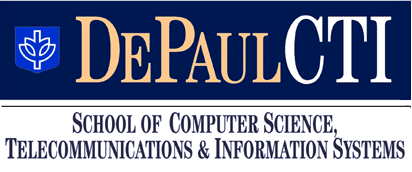
SERVER SIDE WEB DEVELOPMENT
ECT 353 (701)
Marcus
Schaefer
Latest additions
If you can't find the Northwind database, you can download a zipped
version from here.
Prerequisites
- Experience developing web-pages, and good knowledge of HTML (not HTML
editors). Javascript and CSS might be helpful, but won't be required.
- Programming background. This class is not a good first programming class.
You should know at least one programming language well.
Accounts
You can find out about your accounts, and activate them at http://ecthome.cs.depaul.edu/
.
Homeworks and Examples
Assignments will be available
through this webpage. Homeworks are due on the day of class. Programs
have to be up on the sever by midnight, hardcopies of the program have to be
submitted by the beginning of class. If
you hand in the homework late 20% will be taken off the score for each day.
Questions and Answers
- I have prepared a page with links
covering some background topics like HTML, CSS, and Javascript.
-
To find out when and where to find lab tutors, check the tutor
page.
-
A class discussion
forum is now online. Login
to dlweb, and find the class page with a link to the discussion forum.
Schedule
Classes and office hours
The class meets M5:45-9:00 in Lewis 1104.
My office hours are MTh 4:00-5:30.
During that time you can find me in the CS&T building, room
749.
If you want to set up an appointment at another time, or
simply ask a question,
send email to mschaefer@cdm.depaul.edu.
Syllabus
For general information (literature, course summary), see the class
syllabus.
|
Week 1
|
Review HTML, Homesite
|
|
Week 2 through 4
|
Server-side Programming in ASP: basic concepts
|
|
Week 5, 6
|
ASP Objects
|
|
Week 7, 8, 9
|
Handling data (Access, etc.).
|
|
Week 10
|
ASP.net
|
Literature
The required text for this class is Buser, Duckett, Francis, Kauffman, Llibre,
Sussman, Ullman: Beginning
Active Server Pages 3.0, Wrox Press Ltd, 1999. As an optional text for
Homesite you can use Ben Forta, Teach
yourself Homesite 4 in 24 Hours, Sams, 1999.
Homework: 40%, Midterm Project: 25%, Final Project: 35%.
General Policies
Academic Honesty
- The course adheres to the university guideline on Academic Integrity
Policy (http://www.depaul.edu/~handbook/code17.html):
- Cheating is any action that violates university norms or
instructor's guidelines for the preparation and submission of
assignments. This includes but is not limited to unauthorized access to
examination materials prior to the examination itself; use or possession
of unauthorized materials during the examination or quiz; having someone
take an examination in one's place; copying from another student;
unauthorized assistance to another student; or acceptance of such
assistance.
- Plagiarism is a major form of academic dishonesty involving the
presentation of the work of another as one's own. Plagiarism includes,
but is not limited to the following:
- The direct copying of any source, such as written and verbal
material, computer files, audio disks, video programs or musical
scores, whether published or unpublished, in whole or part, without
proper acknowledgment that it is someone else's.
- Copying of any source in whole or part with only minor changes in
wording or syntax, even with acknowledgment.
- Submitting as one's own work a report, examination paper, computer
file, lab report or other assignment that has been prepared by
someone else. This includes research papers purchased from any other
person or agency.
- The paraphrasing of another's work or ideas without proper
acknowledgment.
- A charge of cheating and/or plagiarism is always a serious matter.
If proven, it can result in an automatic F in the course and possible
expulsion.
- The use of others' web/publication content (text, graphics, codes) is
regarded as plagiarism without giving credit (see the above description of
plagiarism).
- When you directly quote someone's work, you must put it in quotation
marks. Without such quotations and reference, it is regarded as an act of
plagiarism (see the above description of plagiarism).
- Using materials that the student prepared for other purposes (e.g.,
another course or for his/her work) needs the course instructor's prior
permission.
ECT Server Use
- Concerning the web site use, CTI adheres to the World Wide Web Policy (http://www.depaul.edu/policy.html)
set by the university.
- The use of ECT servers is solely for the educational purposes of ECT
courses.
- The attempt to sell merchandises through ECT server is strictly
prohibited.
- The content of web pages students post on the server must not be
indecent, defamatory and/or inflammatory.
- When posting a prototype commercial web site for ECT courses, students
must indicate at least in the home page and the check-out pages that the
site is a non-commercial in nature.
- Along this line, students must indicate in their prototype web site
that the viewers are not to enter their real personal information
especially their credit card numbers.
- The use of someone else's firm name, trademark, brand name, web
content and/or web components (e.g., graphics, HTML code, scripts) is
prohibited.
- Student accounts expire at the completion of the ECT course they take.
- It is students' responsibility to keep backups of their work on the
server.
- The student does not use excessive amount of server resources (i.e., disk
space, server CPU time).
- If and when an inappropriate use of ECT servers is found, the server
administrator will have the rights to remove students' work that caused such
use.
Incomplete
An incomplete grade is given only for an exceptional reason such as a death in
the family, a serious illness, etc. Any such reason must be documented. Any
incomplete request must be made at least two weeks before the final, and
approved by the Dean of the School of Computer Science, Telecommunications and
Information Systems. Any consequences resulting from a poor grade for the
course will not be considered as valid reasons for such a request.
Marcus Schaefer
Last updated: September 10th, 2001.

